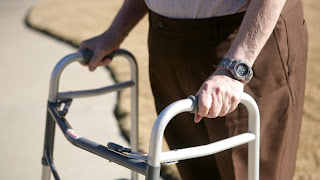Wellness & Prevention
TIPS TO MAINTAIN HEALTHY AGING
Staying Healthy — How to Take Charge of Your Health
Agency for Healthcare Research and Quality © 2006
“You may ask yourself,” How do I begin to improve my health habits?”
A good way to start is to set small goals instead of large ones that you won’t be able to meet. For example, instead of setting a goal of losing 15 pounds in the next year, set some smaller goals for eating better and being more active. You may decide to trade your morning donut for a bowl of cereal or start taking the stairs instead of the elevator at work.
REDUCING YOUR RISK FOR HEART DISEASE
Overall, you can reduce your risk for heart disease if you:
- Maintain a healthy weight.
- Eat right.
- Stay physically active.
- Quit smoking.
- Control your blood pressure and cholesterol levels.
- If you have diabetes, control your disease.
WATCHING YOUR WEIGHT
Being overweight increases your risk for heart disease, diabetes, and high blood pressure. Your doctor can tell you what you should weigh for your height.
- To stay at a healthy weight, you need to balance the number of calories you eat with the number you burn off by your activities. You can get to your healthy weight and stay there by doing two things: eating right and being physically active.
- Ask your doctor or nurse: What is a healthy weight for me? What are some ways I can control my weight?
EATING RIGHT
Eating the right foods and the right amounts can help you live a longer, healthier life. Many illnesses and conditions-such as heart disease, obesity, high blood pressure, and type 2 diabetes-can be prevented or controlled by eating right. A healthy diet also provides the vitamins and minerals you need. It is never too late to start eating right. Watch portion sizes.
- Don’t choose “super” or other oversized portions.
- Be aware of how much you eat.
KEEPING ACTIVE
Physical activity can help prevent:
- Heart disease.
- Obesity.
- High blood pressure.
- Type 2 diabetes.
- Osteoporosis (thinning bones).
- Mental health problems, such as depression.
Physical activity also helps you stay at a healthy weight, reduce stress, sleep better, and feel better overall.
WHAT TO DO
All kinds of physical activity, whether it is moderate or vigorous, will help you stay healthy. It’s a good idea to aim for at least moderate activity-such as brisk walking, raking leaves, or house cleaning-for 30 minutes most days of the week. Generally, the more active you are, the healthier you will become.
HOW TO GET STARTED AND KEEP AT IT
- If you have not been active, start slowly.
- Choose something that fits into your daily life.
- Choose an activity you like, or try a new one.
- Activities such as dancing, swimming, or biking can be fun.
- Ask a friend to exercise with you, or join a group.
- Make time in your day for physical activity.
- If the weather is bad, try an exercise show on TV, watch an exercise tape, walk in the mall, or work around the house.
- Ask your doctor or nurse: How do I get started with an exercise program?
PREVENTING SKIN CANCER
Skin cancer is often preventable.
You can lower your risk for skin cancer by:
- Limiting the time you spend in the sun, especially between the hours of 10 a.m. and 3 p.m.
- Wearing sunglasses and clothing that protects against the sun-such as broad-brimmed hats, long-sleeved shirts, and long pants-when you are in the sun.
- Using sunscreen when you are in the sun. (But, don’t stay out in the sun longer just because you are wearing sunscreen.)
PREVENTING INJURY
Following basic safety rules can prevent many serious injuries. Here are two checklists to follow to help keep you and your family safe.
To help protect yourself at home:
- Use smoke detectors. Remember to check the batteries every month. Change the batteries every year.
- You may want to use a reminder. For example, change the batteries around your birthday or some holiday.
- Lock up guns and ammunition, and store them separately.
- Keep hallways and stairwells well lit.
- Remove or repair things that someone could trip on, such as loose rugs, electrical cords, and toys.
TO HELP PROTECT YOURSELF AWAY FROM HOME:
- Wear seat belts.
- Never drive after drinking alcohol.
- Always wear a safety helmet while riding a motorcycle or bicycle.
- Be alert for hazards in your workplace. Follow workplace safety rules.
TAKING MEDICINES CORRECTLY
Always be sure you know everything about a medicine before you take it. This information will help you get the full benefits from your medicine. It will also help you avoid taking too much or too little of a medicine. Taking medicine in the wrong way can make you worse instead of better.”
The excerpt above was taken from, “The Pocket Guide to Staying Healthy at 50+” published by the U.S. Department of Health and Human Services — Agency for Healthcare Research and Quality © as posted on the Agency for Healthcare Research and Quality (AHRQ) web site, June 2006. For the complete text of “The Pocket Guide to Staying Healthy at 50+” visit the AHRQ web site at: www.ahrq.gov
FINDING THE RIGHT DOCTOR
Choosing the right doctor is one of the most important decisions you will make about your health care. You must begin by finding a family doctor, internist, or board-certified geriatrician to serve as your Primary Care Physician. Your Primary Care Physician will refer you to a Specialist, if specific medical conditions warrant it.
Finding the right doctor may require some research on your part, but it helps if you know what you are looking for.
Consider these three important questions.
- Is the doctor well trained and experienced in working with older adults?
- Is the doctor, or the doctor’s staff, available when needed?
- Will the doctor listen to you and involve you in decisions that affect your health?
Once you are satisfied with the answers to these questions, you must consider manner, style, and personality. In the end, you or your loved ones must trust the doctor and feel comfortable working with him or her.
Having confidence in your doctor is vitally important to your sense of well being, particularly when acute illnesses occur or when surgery is required.
PARTNERING WITH YOUR DOCTOR
Good partnerships are based on good communication and shared decision-making. You can be a partner with your doctor by preparing for and playing an active role during office visits.
These following suggestions will help.
- Prepare an Ask-the-Doctor Checklist before your visit
- Bring your list of symptoms to your office visit
- Write down your main concern and practice describing it
- Write down your hunches and fears about what is wrong
- Write down the three questions that you want answered the most
- Bring with you the medications that you are taking or at least a list of them. Be sure to note the name of the drug, the dosage, and when you began taking it. Don’t forget to include vitamin supplements and over the counter medications as well.
PLAY AN ACTIVE ROLE IN THE MEDICAL VISIT
- Begin by stating your main concern, describing your symptoms, and sharing your hunches and fears. Don’t be embarrassed about looking at or reading from your list!
- Be honest and straightforward. Don’t hold back because of embarrassment or fear of criticism. Hiding information from your doctor makes it difficult for the doctor to do a thorough job.
- If your doctor prescribes a medication, test, or treatment, get more information about it.
- Ask if the doctor has a pamphlet or information sheet about the medication or procedure.
- If you are unsure about why you need a recommended treatment or medication, ask “Why”. Insist that the doctor explain the reasons and any alternatives that might be available.
- Take notes about the diagnosis, the treatment, and the follow up plan. It is helpful to take along a friend or family member who can take notes while you speak with the doctor about these matters.
- Review and summarize. Ask the doctor to confirm that your understanding is accurate and complete. Ask any additional questions that you have if time permits.
- If you think of questions after the visit, don’t hesitate to call the doctor’s office and ask for clarification.
SIX TIPS FOR HEALTHY AGING
This includes exercise, nutrition, sleep, personal habits, and management of illness
2. Stay Mentally Active
Your mind needs mental activity just as your body needs physical activity.
3. Nurture the Ties that Bond
Maintain family and social relationships
4. Know Where Your Help Is
Utilize community services that help keep you independent
5. Accentuate the positive
Focus on the things that you can do and express thanks
6. Celebrate Your Wisdom
Recognize your Purpose for Living. Help others to gain wisdom.







No comments:
Post a Comment